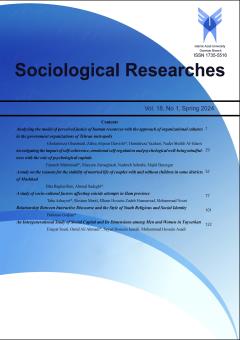A study on the reasons for the stability of married life of couples with and without children in some districts of Mashhad
Subject Areas :
Keywords: Married life, Couples, Child, Comparative analysis, Sustainability of marriage,
Abstract :
The present study compares the reasons for cohabitation in couples with and without children with ten years of cohabitation. The sample size of the research includes 38 people (15 men and 18 women), which was done based on the targeted sampling method among couples with children and without children who have been married for more than ten years in some areas of Mashhad, despite the lack of satisfaction with married life, they have been stable in their marriage. The method of collecting information is the interview. The thematic analysis method was used with the help of MAXQDA software to analyze information and data. The results showed that managerial, economic factors, responsibility, collective pressures, communication skills, and marital quality are the reasons for the stability of life in couples with and without children, and having children has led to the mention of different reasons for the continuity and stability of the joint life. It means that the couples mentioned different sub-components in the subset of the main reasons for the stability of their life together.
بهاری،زهرا .(1394). نقش سبک زندگی در رضایت زناشویی زوجین. فصلنامة فرهنگ مشاوره و روان¬درمانی، 6(2)، 145-126. https://qccpc.atu.ac.ir/article_4212.html
پولادی، اسماعیل؛ جهانبخش، اسماعیل؛ محمدی، اصغر. (1398). تبیین جامعه¬شناختی مناسبات زندگی مشترک زوجین بوسیله الگوهای تربیتی خانواده. پژوهش¬های جامعه¬شناختی، 12(1 و 2)، 29 – 8.
https://soc.garmsar.iau.ir/?_action=press&lang=en&lang=fa
حسن زاده، صالح .(1393). عوامل تحکیم خانواده در فرهنگ اسلامی. پژوهش¬نامه معارف قرآنی، 4(15)، 68 – 45.
https://rjqk.atu.ac.ir/article_1030.html
حسینی، مریم .(1390). رابطه سبک¬های مقابله¬ای با صمیمیت و تعهد زناشویی در فرهنگیان شهر ایلام[ پایان نامه کارشناسی ارشد، دانشگاه علامه طباطلایی دانشگده روانشناسی و علوم تربیتی].
قزلباشیان، زهرا؛ عارفی، مختار .(1394). صمیمیت زناشویی و خرسندی زناشویی در زنان نابارور و عادی. مجله تحقیقات بالینی در علوم پیراپزشکی، 4(4)، 367-360.
https://brieflands.com/articles/jcrps-82078
کاوه فارسانی، ذبیح¬اله؛ رجبی، غلامرضا؛ امان¬الهی، عباس؛ خجسته¬مهر، رضا .(1399). تدوین مدل بومی کیفیت زناشویی: پژوهشی کیفی بر اساس نظریة زمینه¬ای. دانش و پژوهش در روانشناسی کاربردي، 1(21)، 71-60.
https://jsr-p.isfahan.iau.ir/article_667694.html
مدیری، فاطمه؛ قاضی طباطبایی، محمود .(1397). بررسی تاثیر کیفیت زندگی زناشویی بر قصد فرزندآوری. جامعه-شناسی نهادهای اجتماعی، 5(12)، 94 – 73.
https://ssi.journals.umz.ac.ir/article_2133.html
موسوی، سیده فاطمه؛ دهشیری، غلامرضا (1394). نقش فاصله بین انتظارات و واقعیت رابطه زناشویی در رضایت زناشویی زنان و مردان شهر تهران. مجله مطالعات اجتماعی روانشناختی زنان، 13(2)، 110 – 93.
https://jwsps.alzahra.ac.ir/article_2051.html
نصیری ده¬سرخی، راضیه؛ دهشیری، غلامرضا؛ عامری، فریده .(1397). رابطه دلایل ادامه زندگی مشترک با انواع راهبردهای حفظ رابطه زناشویی. مجله مطالعات اجتماعی روانشناختی زنان، 16(2)، 210 – 191.
https://jwsps.alzahra.ac.ir/article_3698.html
نعیمی، ابراهیم؛ سعیدی، میلاد؛ کاظمیان، سمیه .(1397). مقایسه کیفیت زندگی زوجین تک فرزند با زوجین دارای بیش از دو فرزند در خانواده¬های تهرانی. مشاوره و روان درمانی خانواده، 1(27)، 172 – 161.
https://fcp.uok.ac.ir/article_61276.html
یوسفی، ناصر؛ باقریان، مهرنوش .(1390). بررسی ملاک¬های همسرگزینی و فرسودگی زناشویی به عنوان متغیرهای پیش-بین زوجین متقاضی طلاق و مایل به ادامه¬ی زندگی مشترک، فصلنامه مشاوره و روان¬درمانی خانواده، 1(3)، 301 – 284. https://fcp.uok.ac.ir/article_9459.html
Clark, A. E., E. Diener, Y. Georgellis and R. E. Lucas. (2008). Lags and leads in life satisfaction: A test of the Baseline Hypothesis. The Economic Journal, 118(529), 222 – 243. https://doi.org/10.1111/j.1468-0297.2008.02150.x
Lainiala, L (2011). The impact of relationship quality on childbearing in Finland. Finnish Yearbook of Population Research, 46, 31 – 47. https://doi.org/10.23979/fypr.45064
Sanders, K. M (2010). Marital satisfaction across the transition to parenthood. Presented to the faculty of the graduate college at the University of Nebraska in partial fulfillment of requirements.
Zhaoyang, R.,Martire, L. M., & Stanford, A. M. (2018). Disclosure and holding back: communication, psychological adjustment, and marital satisfaction among couples coping with osteoarthritis. Journal of Family Psychology, 32(3), 412 – 418. doi: 10.1037/fam0000390.
Vanassche, s., Swicegood, g & Matthijs, K. (2013). Marriage and children as a key to happiness? Cross-national differences in the effects of marital status and children on well-being. Science & Business Media B. A, 4(2), 23 – 31. DOI: 10.1007/s10902-012-9340-8
Vibha P, Saddichha S, Akhtar S. (2012). Quality of life and marital adjustment in epilepsy and comparison with psychiatric illnesses. Int J Psychosoc Rehabil, 7(23), 81 – 93. https://doi.org/10.1097/NMD.0b013e318288e298

